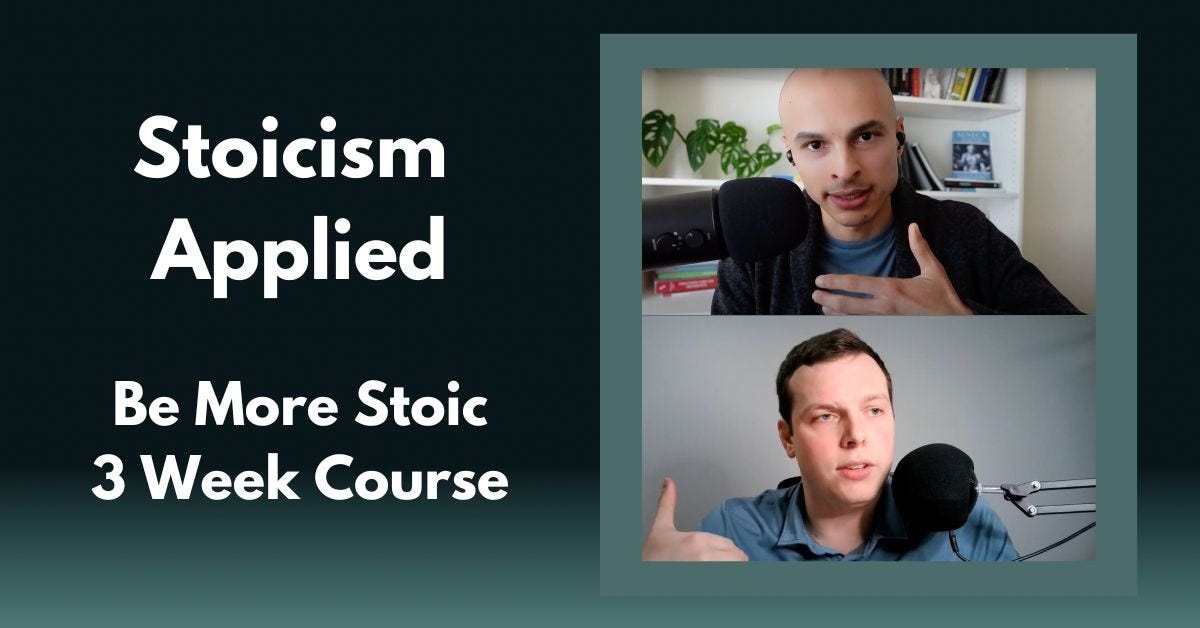Don't expect change in an instant
What is up to you
Happy new year! Welcome to The Stoa Letter, the newsletter on Stoic theory and practice.
We’re starting our live virtual course next week. It’s the perfect place to start for a more resilient and calm 2024. Check it out here and reach out to me if you’re interested, but cannot afford it.
Hope to see you there – Caleb
🏛️ Theory
A common confusion about Stoicism is the idea that you can radically change yourself in an instant.
Now this isn’t impossible. But it’s not what Stoicism teaches.
The confusion emerges from the ideas about what is up to us. It may be worded as follows:
Stoicism teaches that our decisions and judgments are up to us. If we can control that, then nothing is holding us back from changing ourselves into the sage this very instant.
Sometimes, when they encourage themselves, the Stoics support this confusion. Here is Marcus Aurelius:
Within ten days you will seem a god to those to whom you are now a beast and an ape, if you will return to your principles and the worship of reason.
Meditations, 4.16
However, none of the Stoics thought that vice could be transformed into virtue without dedication. That can take years of work. There’s no time to waste.
This principle is evident with a deeper understanding of Stoic theory.
According to the Stoics, life is throwing impressions at us, we reflect on those impressions, agree with them (or not), and then move to action.
Nonetheless, some impressions are overwhelming, presenting themselves with such force that we must believe them. If the sun is out, we cannot convince ourselves that it is nighttime (Discourses 2.18).
Additionally, when we reflect on something, we bring to bear every past judgment. These are informed by our past experiences, character, and animal nature. Our decisions and judgments are up to us – but every new choice is influenced by who we are. Who we are is something we must shape over time.
This implies that we are like broken machines engaged in self-repair. Expecting immediate change is likely not justified. To expect that would be like expecting yourself to never lose focus when you meditate. Minds get distracted. That’s what minds do. Your role is to notice when that happens and return to the meditation object.
Likewise in life. When we become distracted and make mistakes, our job is to notice what happened and then return to what matters.
Action by action.
🎯 Action
Return to your principles today. Live them out. Move in the right direction.
🎺 “This course exceeded all my expectations.”
Michael Tremblay and I are starting our live course 3-week course January 8th!
Check out the reviews from our last cohort: “This course exceed all my expectations. I've learned practical skills to be a better stoic in every day life as well as understood the Stoic theory better”
If you enjoy this letter, the Stoa app, or our podcast – this course is for you.
Registration closes this Sunday.

Stoicism Applied by Caleb Ontiveros and Michael Tremblay on Maven
Build resilience and virtue with ancient philosophy.
maven.com/stoa/stoicism-applied

🔗 Links
🏛️ Learn more about Stoic philosophy by understanding the dichotomy of control.
💬 Epictetus’s advice on changing habits:
If you do not wish to be prone to anger, do not feed the habit; give it nothing which may tend to its increase. At first, keep quiet and count the days when you were not angry: 'I used to be angry every day, then every other day: next every two, next every three days!' and if you succeed in passing thirty days, sacrifice to the Gods in thanksgiving.
📖 Aiming at something noble. Resolutions for human flourishing.
What did you think about today's letter?
🏆️ Share The Stoa Letter
If you find what we’re doing useful, please share it. Just have people sign up with your link below.
Share The Stoa Letter
{{rp_personalized_text}}
Or copy and paste this link to others: {{rp_refer_url_no_params}}
Get hundreds of Stoic meditations and lessons with the Stoa app (free download)

